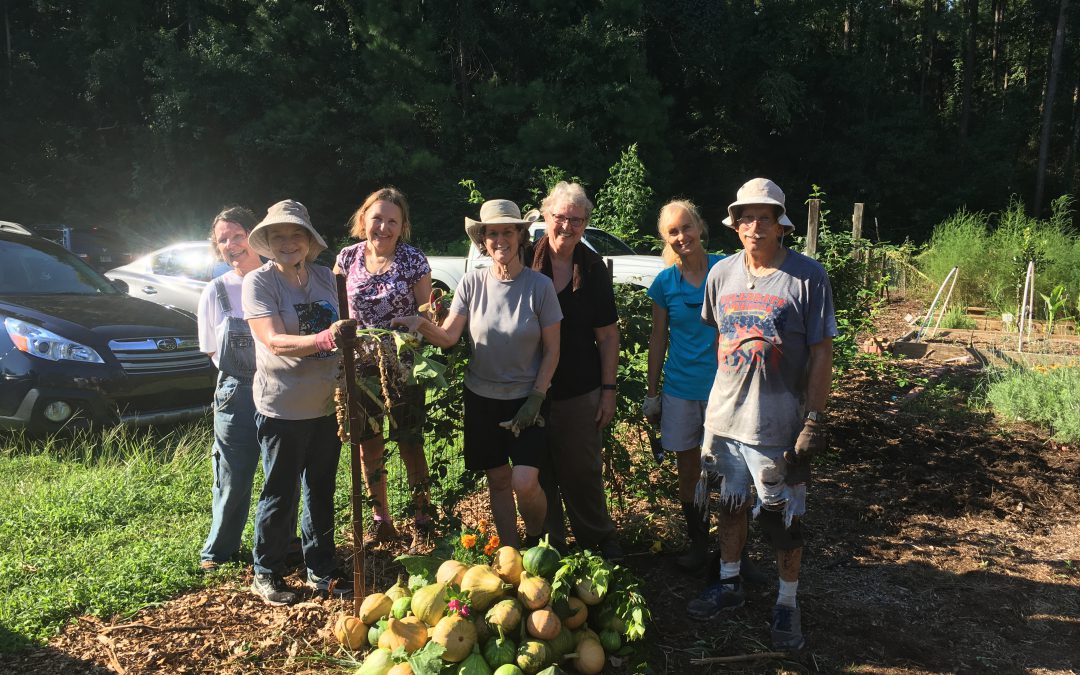
by Mark Tancig | Apr 16, 2019
During my three years working for the Extension Office, I have found that Extension work leaves you extended in many different directions. There are expectations to perform at many different levels and to serve many different constituent groups. From interactions with professional organizations, to assisting with community-wide events, to getting the word out to folks unfamiliar with Extension, it adds up to a lot of potential work out there.
Helping homeowners and/or industry with their specific issues is definitely where the rubber meets the road. Fortunately, in 1973, an extension agent in Washington State came up with a great plan – train interested volunteers in how to properly handle specific requests so they can help get all of this work done. And so was born the Master Gardener Volunteer (MGV) program. In Florida, we are entering the 40th year of the MGV program! Since National Volunteer Week is this week (April 7-13), I thought I would take the opportunity to celebrate the work of MGVs in our area.

In Leon County, one MGV, Janis, has been coordinating the vegetable gardening group, locally known as the VegHeadz, for 8 years. More than once, I’ve heard praises of Janis for her ability to get folks excited about “enter vegetable here”, maybe a Chayote squash, Malabar spinach, food forests, cover crops, soil organic matter, and the list goes on. What makes Janis such a great MGV is her ability to share gardening information, which comes from her pure passion for the topic and her desire to keep learning and experimenting. In addition to sharing information, the VegHeadz also donate much of the produce harvested from our office, approximately 300 pounds a year, to the Second Harvest Food Bank.
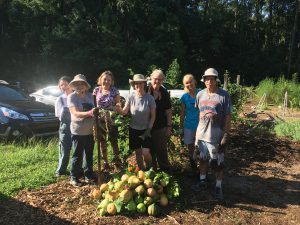
Our happy VegHeadz Group after a day of work in the garden. Led by the incredible Janis Piotrowski (center, black shirt). Credit: Mark Tancig
In counties throughout the panhandle, there are other MGVs providing research-based horticulture information to school groups and civic organizations. Many of them spend time helping to teach Floridians of the importance of protecting Florida’s natural resources while creating a beautiful landscape through the use of Florida-Friendly Landscaping principles.
Clearly, volunteers are great because they help UF/IFAS, and other organizations, get more work done without any monetary input. However, many studies have found that it’s not just the organization who benefits. Based on a review of research published by the Corporation for National and Community Service, volunteers not only give, but also receive the following benefits:
- Lower mortality rates, greater functional ability, and lower rates of depression than those who do not volunteer
- Physical and social activity and a sense of purpose at a time when their social roles are changing
- Higher levels of happiness, life-satisfaction, and self-esteem
The same research review found that volunteers have a greater level of trust in their community, greater level of trust in their local government, and are twice as likely to donate to charitable causes. So not only do the organizations and the individuals benefit, but the whole community shares in these volunteers’ selfless donation of expertise and time.
Now, during National Volunteer Week, be sure to thank a volunteer for their work. If you see MGVs at community events, please say thank you for their role in spreading research-based, environmentally-sound horticulture knowledge to the community.
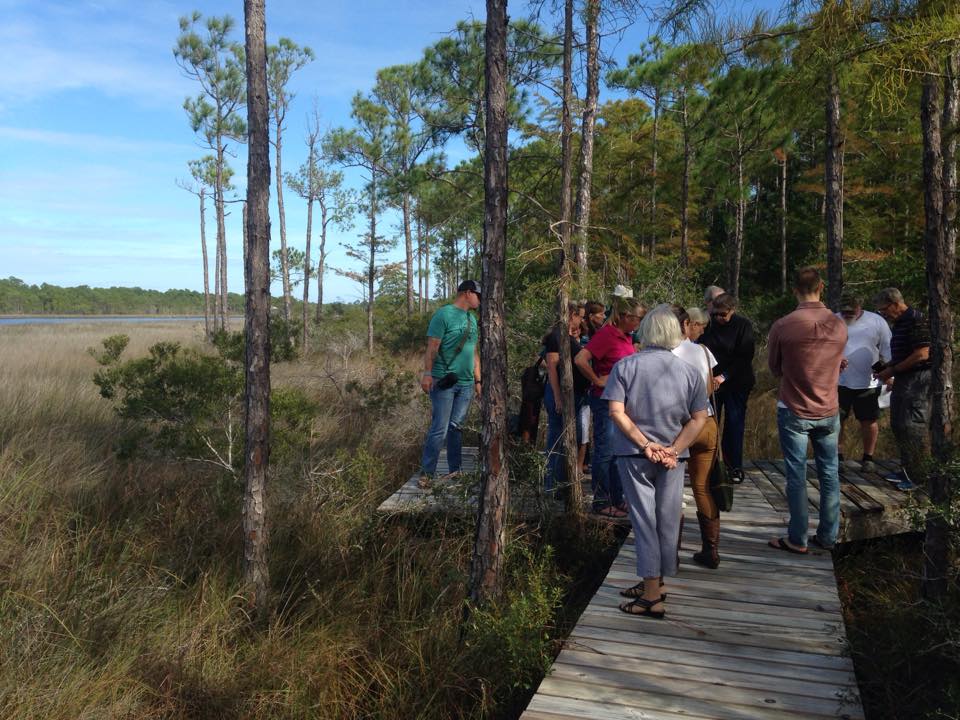
by Carrie Stevenson | Feb 3, 2016
Do you love the outdoors? Wish you knew more about the plants and animals native to our area?
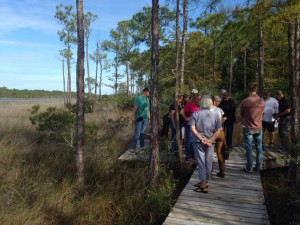
Master Naturalist Jerry Patee leads classmates along his project: a wetland boardwalk in Perdido Key. Photo credit: Carrie Stevenson
The Florida Master Naturalist Program is a course offered by Extension agents throughout the state, including the northwestern counties. Three different modules—Freshwater Wetlands, Coastal, and Uplands—are offered. They include 40 hours of instruction time on ecosystems, plant identification, animal ecology, and how humans live within the environment. Each class includes 2-3 field trips which may entail hikes, paddling, or tours of local museums and parks. Adult students are expected to produce an educational project at the end of the course, which may vary from a display or presentation to a skit or full-blown nature trail.
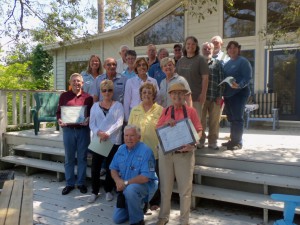
Proud Master Naturalist students at their graduation. Photo credit: Carrie Stevenson
Several Master Naturalists have recently brought their projects to life. Several years ago, Charlie Lurton created a plan to build living shorelines in Bayou Grande behind homes in his neighborhood. The project was approved by state and federal environmental regulatory agencies and oyster reefs and planting have recently begun. Jerry Patee, also an Escambia County Master Gardener, worked with his church to create a boardwalk trail through wetlands to a pristine view of Bayou Garcon in Perdido Key.
Master Naturalist students vary in backgrounds from retired military and teachers to new residents and college students. Many Master Gardeners find the courses a helpful addition to their training, and utilize their newly gained knowledge when working with clientele. At completion, students receive an official Florida Master Naturalist certificate, pin, and patch. Several Panhandle courses will be offered this spring—check out the FMNP website to see when a class will be offered near you!
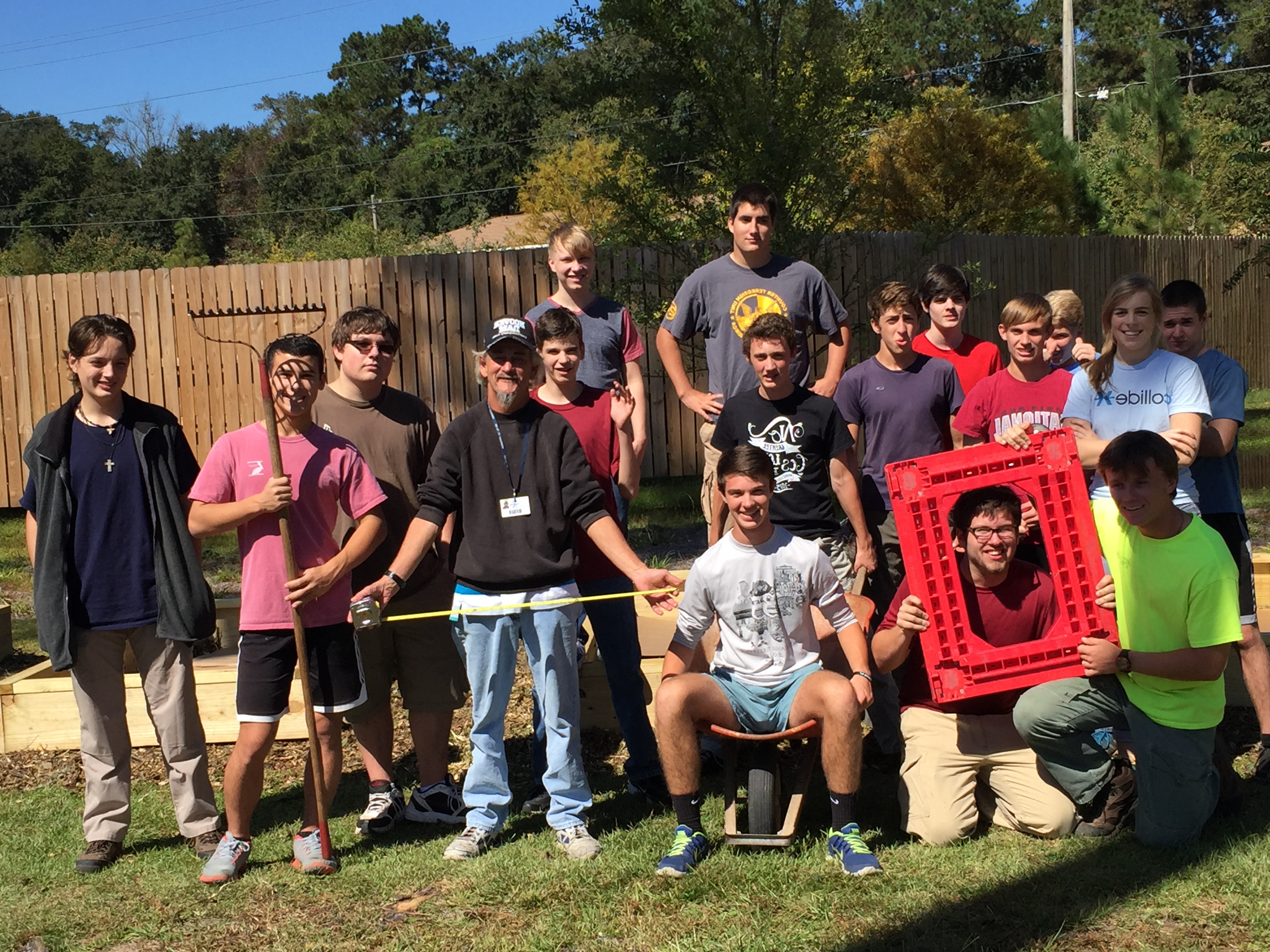
by Molly Jameson | Jan 13, 2016

Volunteers after lots of hard work mulching and adding compost to eight raised beds at The Shelter garden.
Have you ever been interested in volunteering at a school or community garden? Are you involved with a garden that could use some help? Well, UF/IFAS Leon County Extension recently started an Adopt-a-Garden program for volunteers to “adopt” a school or community garden for volunteer credit. Volunteers can teach hands-on gardening techniques, conduct educational talks and present displays at garden workdays, assist with garden planning and networking, encourage gardeners to work together, and help with any other activity that adds to the vitality of the garden. The program focuses on garden education and outreach as the primary objectives.
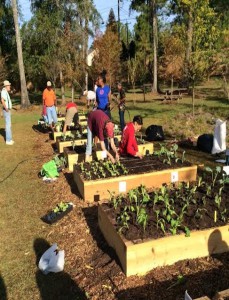
Volunteers hard at work planting fall vegetables in The Shelter garden.
The first major project of the Adopt-a-Garden program has been very exciting, with UF/IFAS Leon County Extension Master Gardeners “adopting” the new homeless shelter at the Kearney Center in Leon County. Master Gardeners lead the way in the organization and construction of eight raised bed vegetable gardens located on site directly behind The Shelter facility. They were awarded a community garden mini-grant from Leon County, which helped to cover garden supplies.
The Leon County Master Gardeners have received assistance from UF/IFAS Extension Agents, Florida State’s College of Social Work, and many other members of the community in gathering supplies and donations, recruiting volunteers, communicating with The Shelter staff, building and filling the raised beds, planting the garden, and maintaining the garden.
The gardening materials for The Shelter garden were generously supplied at no coast or at discounted costs by Lowe’s Home Improvement, Britt’s Dump Truck Services, Tallahassee Nurseries, Native Nurseries, Asplundh, and the FSU College of Social Work.
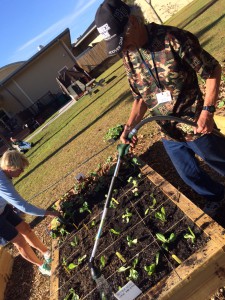
Shelter resident watering freshly planted lettuce.
Leon County Extension and Leon County’s Office of Resource Stewardship will conduct shelter resident and staff garden trainings to ensure the garden is maintained and successful going forward. Extension’s Family Nutrition Program is currently offering nutrition education classes to shelter residents as well.
This project will allow shelter residents to get hands-on experience working in a vegetable garden, learn about different vegetable varieties, and taste their harvest, as vegetables that are grown in the garden go directly to The Shelter kitchen for meal preparation. The garden was officially dedicated as the Wendy Crook Memorial Garden by Leon County Government, with the dedication event reported by local television station ABC 27 WTXL. The article and video clip can be viewed here.
Along with the Wendy Crook Memorial Garden, other school and community gardens have been “adopted” by volunteers. If you are in the Leon County area and are interested in becoming a volunteer with the Adopt-a-Garden program, you can find out more information at the Leon County Adopt-a-Garden website or contact Extension Agent Molly Jameson, at mjameson@ufl.edu. Volunteers are encouraged to team up on garden projects and all levels of gardening experience are welcome.









